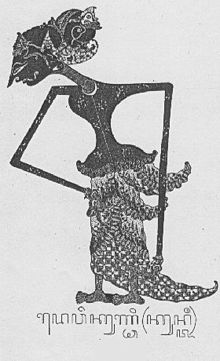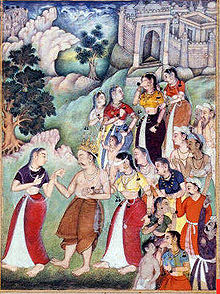- Kunti
-
- for other uses see Kunti (disambiguation)
 Kunti in Javanese Wayang
Kunti in Javanese Wayang
Kunti (Sanskrit: कुंती Kuṃtī) is the mother of the eldest three of the Pandava brothers from the Indian epic Mahābhārata. Her story is also told within the Bhagavata Purana, wherein she speaks on the philosophy of devotion of Krishna, known as Bhakti yoga. Kunti is thus held as a figure of great importance within many Hindu traditions and especially with worshippers of Krishna (Vaishnavas).
Contents
Parentage and upbringing
Her father was Shoorsen (Śũrasena) of the Vrishni clan, and she was named Pritha (Pṛthā). She was thus the sister of Vasudeva, father of Krishna. She was given in adoption to the childless King Kuntibhoja, after which she became known as Kunti. After her arrival, King Kuntibhoja was blessed with children. He considered her his lucky charm and took care of her until her marriage.
Children
When she was young, the rishi Durvasa told her a mantra with which Kunti could summon any deva and have a child by him. When Kunti asked why he gave her this mantra, he told her that it would be useful to her later in life.
Kunti could not believe the mantra, so she tried to use it. The god Surya, appeared. She asked him to go back, but Surya said he was compelled to fulfill the mantra before returning. After birth of the child, Kunti abandoned him in a basket in a river. This child was later found and adopted by a chariot driver and his wife, and was named Karna. He went on to become a central character in the Mahābhārata. The ambiguous emotions Karna felt about his birth mother play an important role in the Mahābhārata.
Later life
Later on, Kunti married Prince Pandu of Hastinapura. He took a second wife Madri, but was unable to father children due to a Rishi's curse. Once, when Pandu was on a hunting excursion, he shot an arrow at a deer-couple, which to his misfortune turned out to be sage Kindama and his wife. The dying sage cursed Pandu that as he had killed them in their moment of union, the moment he unites with a woman will be his last. Grief-stricken, he decided to abandon palace life for doing penance and proceeds to the forest with his wives, to live in self-imposed exile. Then, when the erstwhile king expresses concerns about dying childless, Kunti revealed her secret mantra. She used it three times, first receiving a son, Yudishtira, from the god Dharma, then Bhima from the god Vayu, and thirdly Arjuna, from the god Indra. Kunti revealed the mantra to Madri, who bore twin sons, Nakula and Sahadeva, from the twin gods the Asvins. The five together are known as the Pandavas.
After the death of Pandu and Madri, Kunti was left to tend for all five sons. After the great battle of Kurukshetra and in her old age, she goes in exile to the forest, with her brothers-in-law Dhritarashtra and Vidura, and Dhritarashtra's wife Gandhari where they die together in a forest fire.
Kunti's character
Kunti's character within the Mahābhārata is accorded much respect within the Hindu tradition. Her activities were that of a very pious and loyal wife and of a person with a great deal of self-control. Kunti was given a special boon which enabled her to bear the sons of great celestial devas as many times as she wished. However Kunti did not misuse her boon, limiting herself to three sons only. In spite of Pandu's pleas for more sons, Kunti held onto the Shastras which state that one should not have more than 3 children when the children are not conceived in the usual manner.
And, when requested by Pandu, she shared this special mantra with Madri, Pandu's other wife.
Further reading
A number of Kunti's prayers from the Puranas were published in the late 1970s as part of a book by A. C. Bhaktivedanta Swami Prabhupada, entitled 'Teachings of Queen Kuntī' which comprises verses 18-43 from the eighth chapter of the Bhagavata Purana.[1]
See also
References
External links
- Teachings of Queen Kunti
- A story showing greatness of Kunti Devi.
- Persons and Stories from Mahabharata.
Mahabharata Kuru Kingdom Santanu · Ganga · Bhishma · Satyavati · Chitrāngada · Vichitravirya · Ambika · Ambalika · Vidura · Dhritarashtra · Gandhari · Shakuni · Pandu · Kunti · Madri · Yudhisthira · Bhima · Arjuna · Nakula · Sahadeva · Duryodhana · Dushasana · Yuyutsu · Dushala · Draupadi · Hidimbi · Ghatotkacha · Ahilawati · Subhadra · Uttara · Ulupi · Chitrāngadā · Abhimanyu · Iravan · Babruvahana · Barbarika · Parikshit · JanamejayaOther characters Karna · Drona · Amba · Vyasa · Krishna · Satyaki · Dhristadyumna · Sanjaya · Virata · Kichaka · Kripa · Ashwatthama · Ekalavya · Kritavarma · Jarasandha · Mayasura · Durvasa · Jayadratha · Balarama · Drupada · Hidimba · Shalya · Adhiratha · ShikhandiOther Hindu deities and texts Gods 
Goddesses Texts Categories:- People related to Krishna
- Characters in the Mahabharata
- Queens consort
- Sanskrit words and phrases
Wikimedia Foundation. 2010.

